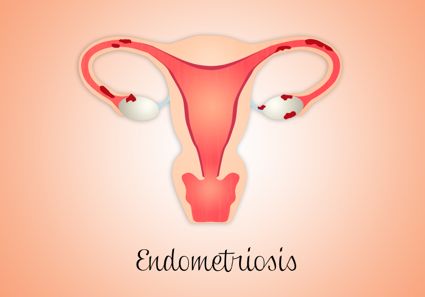Endometriosis – an OB-GYN’s Perspective
By Serena D. Tidwell M.D, Midtown OB/GYN
Endometriosis is a very common cause of pain in women. It is most commonly diagnosed in women age 25 to 35; however two-thirds of women diagnosed report that their symptoms started before age 20.
One third of adolescents and adults age 25-35 with chronic pelvic pain will have endometriosis. It is rare to be diagnosed with endometriosis or have new symptoms after age 35.
What is Endometriosis?
It is when cells that line the uterus – the endometrial cells – implant in areas outside the uterus. These cells then swell with blood just like the endometrial cells inside the uterus. As they swell they cause symptoms. The most likely areas of implantation are in the pelvis – however, it can occur anywhere in the body (even places like the lung, etc.).
What causes Endometriosis?
While we don’t know for certain, several theories exist:
- “Retrograde menstruation”. Typically, when we menstruate the blood flows out thru the cervix. This theory proposes that some blood can flow out of the fallopian tubes and into the abdominal cavity and thus some of the endometrial cells implant there.
- Altered Immunity. This theory proposes that a woman’s immune system is altered and allows endometrial cells to grow in areas outside the uterus.
- Lymphatic / Blood vessel. This theory proposes that endometrial cells are transported to other sites by blood vessels or lymphatic vessels.
Is it genetic or hereditary?
If a first-degree relative has endometriosis, then you are at increased risk but these patterns are not clear-cut.
What are the Presenting Symptoms?
- Pelvic pain. In adolescents this is cyclical (with menses) and also acyclic (not with menses) pain. In adults however, it is more likely to be cyclical – with menses. The pain with menses will typically start 1-2 days before menses, last throughout the menses and may persist for a few days after menses.
- Pain with intercourse. This will occur in about 50% of sexually active women with endometriosis.
- GI symptoms – Bowel / Rectal pain present in 30% of patients and constipation / diarrhea in 36%.
- Infertility – 25% of patients with endometriosis experience infertility.
- Ovarian mass – this is usually where endometriosis implants come together to form what is called an endometrioma. This occurs in 20% of adults with endometriosis.
- Urinary symptoms – usually painful urination is present in 10% of patients.
How is it diagnosed?
The “gold standard” for diagnosis is Laparoscopy. This is a surgical procedure where under anesthesia a camera is inserted under your belly button to visualize the abdomen and pelvis. If endometriosis is located at this time – depending on the locations – it may be able to be burned or cut away.
Many times we make empiric diagnoses based on symptoms and treat without performing the laparoscopy.
How is it treated?
The simplest treatments are to suppress the ovaries, which is most easily accomplished with birth control pills. There are other hormone treatments available. There is one injection – Lupron – that can actually trick your body into menopause. While this usually works very well for treatment of endometriosis, it can also cause menopause symptoms during the treatment (3-6 months). Also, surgical treatments are available to surgically burn or remove the endometriosis.
Will patients with Endometriosis be able to have a baby?
Twenty-five percent of patients with endometriosis have infertility and are best managed by a fertility specialist. The good news is that the majority of those will be able to have a successful pregnancy. Also, symptoms of endometriosis go away during pregnancy!
Does it cause cancer?
There is a very small increased risk of a specific type of ovarian cancer.
Finally, is there a cure?
Some patients get long remissions, but it is a chronic condition. Because endometriosis is a hormone sensitive condition it will go away after menopause. Many patients elect to have a hysterectomy with removal of their ovaries after child bearing to accelerate this process. It is a common reason for hysterectomy in younger patients.
Dr. Serena Tidwell is an OB/GYN with Midtown OB/GYN. She completed residency at Wake Forest University after graduating from The Medical College of Georgia and Emory University. She is the 2013 winner of our Choice Award for Best OB/GYN.




